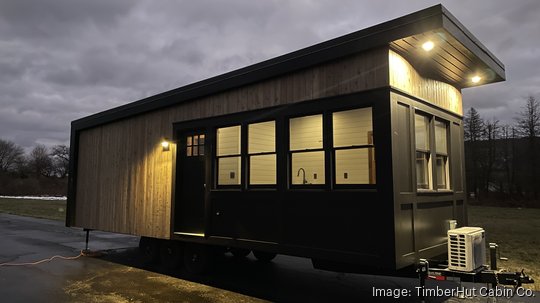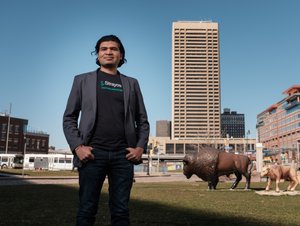
It’s all about the economies of scaling for TimberHut Cabin Co.
The Great Valley-based startup, which designs and makes high-quality, modular structures, is growing by focusing on business-to-business, or B2B, customers and production partnerships.
“My goal personally is to make TimberHut the nationally recognized brand in hospitality, importable hospitality accommodations,” said Brooks Anderson, founder. “Not necessarily the biggest, but we want to build the best product.”
The business expects to produce 50 to 75 units this year, which is about triple of its production last year. The startup, which employs 12, also plans to hire at least four more workers.
That’s in large part to dedicating its focus to B2B sales, which make up about 80% of its business. (Anderson said he’s getting an inquiry or two per day for B2B sales.)
This way, the cost of customer acquisition and the time it takes to sell units is lower compared to business-to-consumer sales. Also, the startup is still able to create a custom design based on the client’s needs, but that design is then used to create multiple units for that customer.
“We can achieve better economics of scale by doing multiple units of a single design,” he said.

The majority of those sales are in hospitality, from structures for adventure tourists to employee housing for seasonal workers. TimberHut is accredited by the Recreational Vehicle Industry Association to build park model RVs, which are cabins on wheels for a one-time transport to their destination. (Think campgrounds, glamping, destination resorts, etc.)
TimberHut also sees opportunity in the short-term housing market, where seasonal workers are now competing with tourists for the same housing stock. That makes recruitment and retainment more challenging for seasonal destinations.
“We’re trying to address that problem by offering units into various municipalities or developers who want to get into this market of seasonal housing or long-term housing for seasonal employees,” Anderson said.
His goal is to scale the business to building up to 500 units next year. To do that, he’s got to tackle one of his company’s biggest challenges: transportation.
Getting customers from all over the country means huge shipping costs for TimberHut’s units. In order to grow the business, Anderson is looking into production partners that have the size and scale to build what his startup needs.
TimberHut would still design and build prototypes from its Great Valley facility, but those prototypes could then be sent to partners to build however many units are needed for its customers.
“We want to be very sensitive to our customers’ needs and functional needs of their guests as well,” he said.








